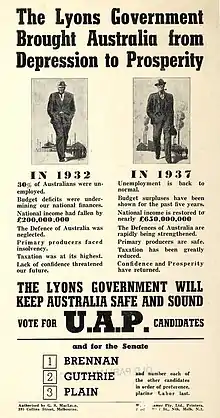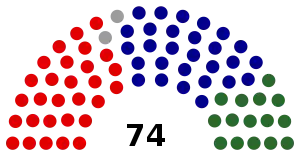| |||||||||||||||||||||||||||||||
All 75[lower-alpha 1] seats of the House of Representatives 38 seats were needed for a majority in the House 19 (of the 36) seats of the Senate | |||||||||||||||||||||||||||||||
|---|---|---|---|---|---|---|---|---|---|---|---|---|---|---|---|---|---|---|---|---|---|---|---|---|---|---|---|---|---|---|---|
| Registered | 4,080,038 | ||||||||||||||||||||||||||||||
| Turnout | 3,699,269 (96.13%)[lower-alpha 2] ( | ||||||||||||||||||||||||||||||
| |||||||||||||||||||||||||||||||
 Results by division for the House of Representatives, shaded by winning party's margin of victory. | |||||||||||||||||||||||||||||||
| |||||||||||||||||||||||||||||||

The 1937 Australian federal election was held in Australia on 23 October 1937. All 74 seats in the House of Representatives, and 19 of the 36 seats in the Senate were up for election. The incumbent UAP–Country coalition government, led by Prime Minister Joseph Lyons, defeated the opposition Labor Party under John Curtin.
The election is notable in that the Country Party achieved its highest-ever primary vote in the lower house, thereby winning nearly a quarter of all lower-house seats. At the 1934 election nine seats in New South Wales had been won by Lang Labor. Following the reunion of the two Labor parties in February 1936, these were held by their members as ALP seats at the 1937 election. With the party's wins in Ballaarat and Gwydir (initially at a by-election on 8 March 1937), the ALP had a net gain of 11 seats compared with the previous election.
This was the first federal election that future Prime Ministers Harold Holt and Arthur Fadden contested as members of parliament, having entered parliament at the 1935 Fawkner by-election and 1936 Darling Downs by-election respectively.
Results
House of Representatives

| Party | Votes | % | Swing | Seats | Change | ||
|---|---|---|---|---|---|---|---|
| UAP–Country coalition | 1.774,805 | 49.26 | –1.01 | 43 | –4 | ||
| United Australia | 1,214,526 | 33.71 | +0.73 | 28 | 0 | ||
| Country | 560,279 | 15.55 | +2.93 | 15 | +1 | ||
| Labor | 1,555,737 | 43.17 | +16.36 | 29 | +11 | ||
| Social Credit | 79,432 | 2.20 | −2.49 | 0 | 0 | ||
| Communist | 17,153 | 0.48 | +0.48 | 0 | 0 | ||
| Independents | 176,214 | 4.89 | +2.38 | 3[lower-alpha 3] | +2 | ||
| Total | 3,603,223 | 75 | |||||
| Two-party-preferred (estimated) | |||||||
| UAP–Country coalition | Win | 50.60 | −2.90 | 43 | +1 | ||
| Labor | 49.40 | +2.90 | 29 | +11 | |||
- Notes
- Four members were elected unopposed, all from the Labor Party.
- Independents: Alexander Wilson (Wimmera, Vic) and Percy Spender (Warringah, NSW).
- The member for Northern Territory, Adair Blain (independent), had voting rights only for issues relating to the Territory, and so is not included in the table.
Senate
| Party | Votes | % | Swing | Seats won | Seats held | Change | ||
|---|---|---|---|---|---|---|---|---|
| Labor | 1,699,172 | 48.48 | +20.40 | 16 | 16 | +13 | ||
| UAP–Country coalition | 1,636,889 | 46.71 | –6.51 | 3 | 20 | –13 | ||
| UAP–Country joint ticket | 1,005,247 | 28.68 | +10.44 | 0 | N/A | N/A | ||
| United Australia | 565,161 | 16.13 | −4.54 | 3 | 16 | −10 | ||
| Country | 66,481 | 1.90 | −12.41 | 0 | 4 | −3 | ||
| Social Credit | 49,801 | 1.42 | −1.36 | 0 | 0 | 0 | ||
| Independent | 118,768 | 3.39 | +2.93 | 0 | 0 | 0 | ||
| Total | 3,504,630 | 19 | 36 | |||||
Seats changing hands
| Seat | Pre-1937 | Swing | Post-1937 | ||||||
|---|---|---|---|---|---|---|---|---|---|
| Party | Member | Margin | Margin | Member | Party | ||||
| Ballaarat, Vic | United Australia | Archibald Fisken | 3.9 | 3.5 | 0.6 | Reg Pollard | Labor | ||
| Bendigo, Vic | United Australia | Eric Harrison | N/A | 0.3 | 6.9 | George Rankin | Country | ||
| Grey, SA | United Australia | Philip McBride | N/A | 2.9 | 7.1 | Oliver Badman | Country | ||
| Warringah, NSW | United Australia | Archdale Parkhill | N/A | 29.4 | 1.9 | Percy Spender | Independent UAP | ||
| Wimmera, Vic | Country | Hugh McClelland | N/A | 2.9 | 1.9 | Alexander Wilson | Independent | ||
- Members listed in italics did not contest their seat at this election.
See also
Notes
- ↑ The Northern Territory had one seat, but members for the territories did not have full voting rights until 1966 and did not count toward government formation.
- ↑ Turnout in contested seats
- ↑ Including Northern Territory
References
External links
- University of WA Archived 18 January 2015 at the Wayback Machine election results in Australia since 1890
- Two-party-preferred vote since 1937



